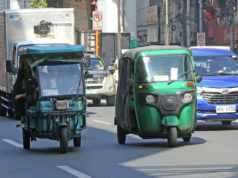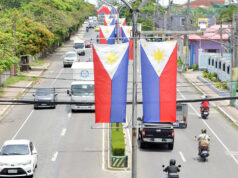Marcos pushes action vs ‘dangerous use’ of coast guard in South China Sea

PHILIPPINE President Ferdinand R. Marcos, Jr. on Thursday urged his Southeast Asian counterparts to act on what he described as the dangerous use of coast guard and maritime militia vessels in the South China Sea, in a gathering attended by a Chinese official.
“We must oppose the dangerous use of coast guard and maritime militia vessels in the South China Sea,” he said at the 18th East Asia Summit attended by Chinese Premier Li Qiang, repeating what he said at the ASEAN Summit this week.
Mr. Marcos said the Philippines is also concerned “over illegal, unreported, and unregulated fishing, and the militarization of reclaimed features” in the waterway.
“We call on ASEAN (Association of Southeast Asian Nations) and our partners to harness our shared interests and rally us into taking joint action, guided by ASEAN centrality and universal multilateralism,” he said.
Earlier, Mr. Marcos told his fellow leaders that while the Philippines does not want to be involved in any violent conflict, it would not hesitate to stand up to foreign aggression.
“Let me be clear, we do not seek conflict,” he said at the 43rd ASEAN Summit retreat in Jakarta on Tuesday. “But it is our duty as citizens and as leaders to always rise and meet any challenge to our sovereignty, to our sovereign rights and our maritime jurisdiction in the South China Sea.”
“No country would expect any less. No country would do any less.”
Tensions between the Philippines and China have worsened after the Chinese Coast Guard, backed by its maritime militia and People’s Liberation Army vessels, fired water cannons to block Manila’s delivery of food and other supplies to a grounded ship at Second Thomas Shoal.
The incident has prompted various countries to issue statements of concerns, including the United States, which has increased its presence in the Indo-Pacific region amid China’s increasing assertiveness at sea.
On the sidelines of the ASEAN Summit on Wednesday, Mr. Marcos met with US Vice President Kamala Harris to discuss tensions in the South China Sea and the two countries’ security ties.
“The two leaders discussed the maritime security environment in the South China Sea and reviewed opportunities to enhance bilateral maritime cooperation, including alongside like-minded partners,” the White House said in a statement.
It said the US official also reaffirmed Washington’s “iron-clad alliance commitment” to the Philippines and reiterated the two countries’ role in keeping the Indo-Pacific region free and open.
At the ASEAN-US Summit on Wednesday, the Philippine leader said Washington is more than just a “longstanding, close and reliable” ally. “The US is also undeniably ASEAN’s partner in achieving our collective goals and aspirations as nations, both on the domestic and on the international fronts,” he said.
Mr. Marcos also recognized a joint statement among the US, Japan and South Korean that expressed support for a free and open international order based on the rule of law, as well as their opposition to any unilateral attempts to change the status quo in the Indo-Pacific waters and the militarization of reclaimed features in the South China Sea.
On Tuesday, he said tensions in the South China Sea are not just due to the worsening conflict between the US and China, a view that he said undermines the Philippines’ legitimate claims.
“The Philippines firmly rejects misleading narratives that frame the disputes in the South China Sea solely through the lens of strategic competition between two powerful countries,” he said.
Security in Southeast Asia and the whole Indo-Pacific region has been a major discussion among ASEAN countries, as they deal with the increasing tension between the US and China.
HUMAN RIGHTS
The US and its Asian and European allies have vowed to make the Indo-Pacific region “free and open” amid what they describe as authoritarian threats.
They are worried about China’s assertiveness in the South China Sea, which is believed to contain massive oil and gas deposits and through which billions of dollars of trade passes each year.
China claims the South China Sea almost in its entirety based on a 1940s map that a United Nations-backed tribunal said in 2016 was illegal.
China recently released a 2023 version of its standard map, featuring a 10-dash line. The Philippines, Vietnam, India and Taiwan have criticized the map.
The Philippines, which is considered a middle power, has been forging alliances with major Asian and western military powers under the Marcos administration as it tries to deter an increasingly belligerent China. It has also pursued closer ties with Australia, which has backed its 2016 legal victory.
On Friday, Prime Minister Anthony Albanese will visit the Philippines — the first visit by an Australian prime minister in two decades — to discuss ties in security, development and education, according to the presidential palace.
Samahan ng Progresibong Kabataan in a statement accused the Australian official of tying economic cooperation with the broader agenda of drawing the Philippines closer into regional alliances led by the US.
“We are already at high risk due to the double threat of American and Chinese aggression,” it said. “We don’t want cooperation with other countries based on picking sides and bringing us closer to war.”
Meanwhile, Human Rights Watch on Sept. 6 said discussions between Mr. Marcos and Mr. Albanese would not be fruitful “without seriously discussing human rights.”
It urged Mr. Albanese to press the Philippine leader to cooperate with the International Criminal Court (ICC) in its investigation of his predecessor’s war on drugs that has killed thousands.
“The war on drugs that Marcos inherited from his predecessor Rodrigo Duterte continues, with almost 400 killings of suspects since taking office,” it said in a statement. “Widespread impunity for these killings and those under Duterte persists. The lack of domestic accountability has prompted the ICC to investigate allegations of crimes against humanity committed during the drug war, as well as earlier killings by then Mayor Duterte’s so-called Davao Death Squad.” — Kyle Aristophere T. Atienza



